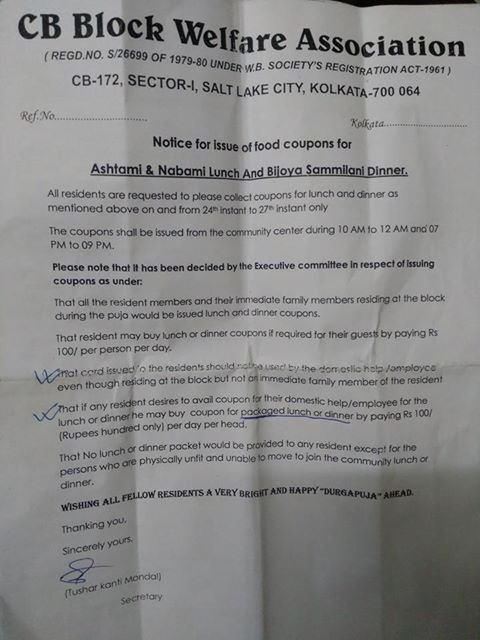Durga Puja in Kolkata might be all about celebrating the city’s cultural pluralism, but the organisers of a puja in Salt Lake region certainly don’t share the sentiment. In a shocking case of discrimination, a domestic help was not allowed to eat lunch alongside other residents at the pujo get-together “nabami” lunch.
The domestic help’s employer, Saubhik Ghosh, described the incident in a Facebook post. He said that he had received six lunch coupons from the CB Block Welfare Association but due to prior engagements, he gave his pass to his domestic help.
He added that it was also a token of appreciation as maids work continuously even during the festive season. However, to his disbelief, the officials of the pujo committee made a mockery of his gesture and insulted the maid in front of everyone who came to join the lunch gathering.
According to Ghosh, the officials said, “Please don’t bring your ‘mashis’ and ‘ayas’ (domestic help /maids ) for lunch to this decent gathering as they are supposed to get a separate coupon for the same and are entitled to only get parcels/packaged lunch.”

After being humiliated, the maid came back and started crying when she back to Ghosh’s house.
“Our help felt very bad and started crying once she came back home with the rest of my family. I was not present there at that time. Later when I went to the officials and protested such a rule, I was shown the circular attached herewith,” Ghosh said.
As Ghosh has also written, we wonder if Durga Puja is only for the rich and elite of the society. Does Goddess Durga only bless those who are well-off and ignore the downtrodden? The classist “rules” of this particular society certainly suggest so.
However, this certainly isn’t the only instance of the rampant discrimination that our domestic workers face. Recently, Noida witnessed a riot-like situation when a domestic worker was allegedly beaten up by her employer in a posh gated colony.
Tripti Lahiri, in her book Maid in India: Stories of Inequality and Opportunity Inside Our Homes, on the condition of domestic workers in India, says that India’s domestic workers are at risk from a ‘toxic relationship’ with their employer. She writes, “They [domestic workers] often work in poor conditions, and are very vulnerable to abuse and assaults, having their pay withheld and not being allowed to go back to their families.”

















